Katarina Carroll: Queensland Police Commissioner mugged by youth crime
Katarina Carroll’s resignation has brought to a head the poisonous politics surrounding youth crime in the Sunshine State.
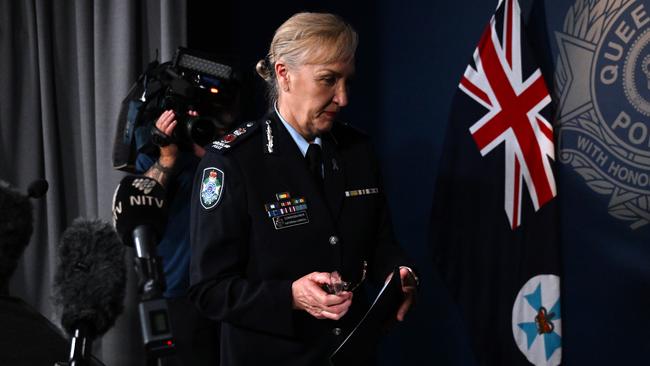
No issue – not interest rates, not the cost of living – grips voters like the hydra-headed problem that is youth crime in Queensland. It tugs raw nerves at every turn, be it perceptions of public safety, intergenerational family dysfunction, entrenched socio-economic disadvantage, the failures of the school system or race relations, the most incendiary element of all.
Typically, the offending manifests like this: a group of teens, often in company with young children, breaks into a home in the dead of night in search of cash, cards and keys to a car that they can steal. The sleeping occupants risk being confronted. Poignantly, food is sometimes taken.
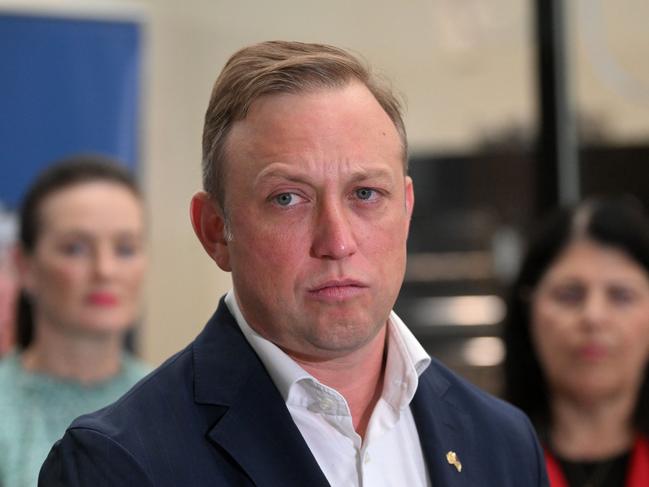
The police inevitably catch up with the young lawbreakers, who might joy ride unlicensed and unconscionably dangerously before being intercepted or dumping the stolen car. Their arrest is of limited comfort to the traumatised victims. Australian Bureau of Statistics figures released a fortnight ago show that youth offenders are committing more violent acts, getting younger and growing in number – with 10,878 individuals aged 10 to 17 facing court in Queensland in 2022-23, up 6 per cent over the previous year, the data reveals.
In the regions, where community anger is white hot, most youth crime is committed by what police call a small, hard core of repeat offenders who cycle in and out of juvenile detention. More than half the recidivists are of Aboriginal or Islander descent, according to Children’s Court figures, grossly disproportionate when Indigenous people make up barely 4.6 per cent of the population.
All too many are the products of broken homes; some have learning and intellectual disabilities arising from fetal alcohol syndrome or other congenital conditions caused by maternal substance abuse; relatively few possess more than rudimentary literacy and numeracy skills. In every respect, they are on the fringe of Australian society. It’s what makes the conundrum of youth crime so vexing for law-enforcers and politicians alike.
Ahead of throwing in the towel on Tuesday, Carroll had been called in to brief state cabinet on her plans to deal with the crisis.
Miles said publicly if the police wanted more resources, they would be provided. The commissioner asked for enhanced “wanding” powers to screen suspects for knives with handheld detectors – a response to the February 3 stabbing murder of Vyleen White, 70, following an alleged carjacking by youths at a shopping centre carpark southwest of Brisbane that was witnessed by the woman’s six-year-old granddaughter – and widened scope for alleged youth offenders to be compelled to wear GPS monitoring bracelets while on bail. Miles not only complied but also announced that the state government would fast-track new laws banning knife sales to under-18s.
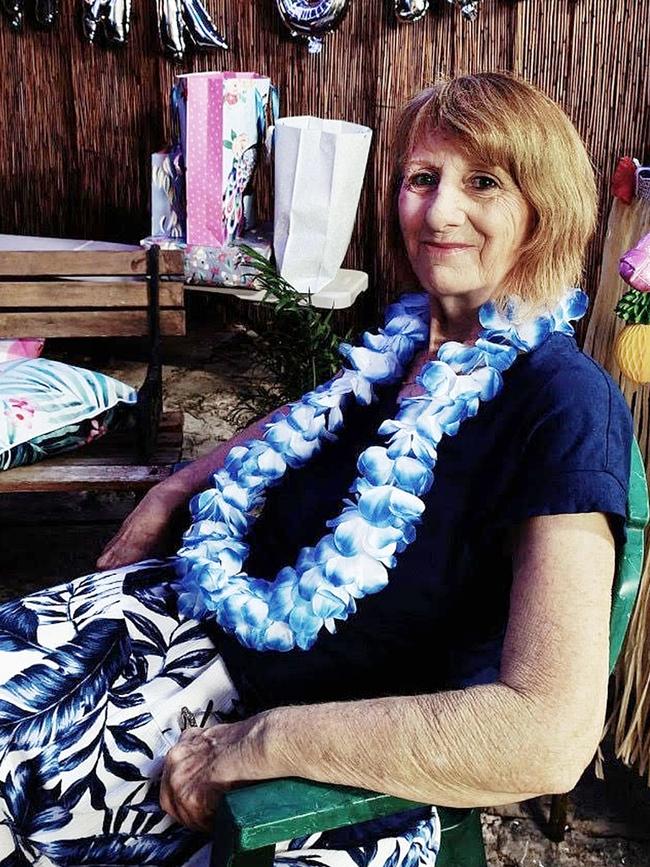
Yet within days his police chief was texting a TV reporter to say she might not seek a contract renewal when her five-year term expired in July. Early on Tuesday morning she had a crash meeting with Police Minister Mark Ryan in the Qantas Chairman’s Lounge at Brisbane airport where she resigned, forcing him to cancel his 7.15am flight to Rockhampton.
An emotional Carroll later insisted she had not been made a scapegoat for White’s death or rank-and-file unrest on the Gold Coast, where some police were threatening to issue a declaration of no-confidence in her leadership over the sanctioning of a popular senior sergeant for authorising officers to ram a stolen car full of teens. The powerful Queensland Police Union was up in arms, demanding that Carroll immediately reinstate the suspended senior sergeant, Arron Ottaway.
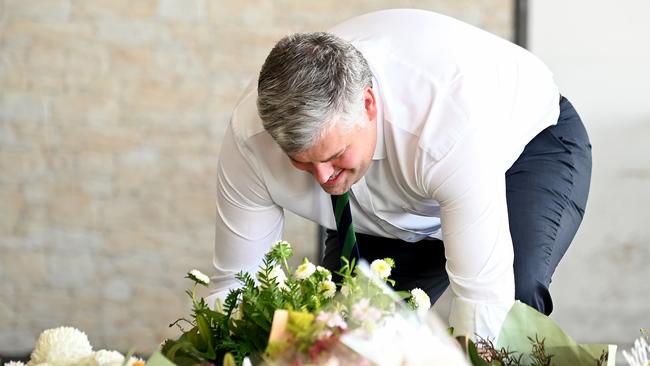
“I would love to have had the conversation with the minister in my time … but I purposely brought it forward so we can move on,” she said. “This was my decision.”
In the government’s defence, Ryan issued a statement affirming that he would have been “supportive” had Carroll sought an extension. Still, there’s no doubt her resignation, effective next Friday, offers the welcome prospect of a reset on youth crime under a new commissioner. There were growing signs that the government, too, was frustrated by Carroll’s failure to arrest the mayhem, and senior journalists were backgrounded that her time was up. On the weekend of December 17-18 when Miles took over from Annastacia Palaszczuk and moved into the premier’s 40th floor suite, balaclava-clad louts used stolen cars to block access to an ambulance station in Townsville; in another brazen confrontation, a police officer there was taken to hospital after being sprayed with a fire extinguisher.
As one senior Labor figure notes: “People are fed up, and you’re seeing that reflected in the polling. These kids have no fear of the police, no fear of going to juvie, and I’m not sure Carroll had any answers on what to do about the situation … which has been getting worse and worse for us in places like Townsville.”
The northern city contains three state Labor seats, all up for grabs in October’s Queensland election. This will be watched especially closely given it’s the first time voters head to the polls since Anthony Albanese came to power in Canberra. And it may have been no coincidence that three-time election winner Palaszczuk quit within days of receiving an updated tranche of taxpayer-funded issue polling, excoriating on youth crime. The takeout was that Queenslanders felt less safe, with satisfaction on this measure down five points to 56 per cent; 67 per cent of the respondents said crime was an issue in their community.
Separately, UComms polling for The Courier-Mail showed two-thirds of voters believed the state government had been “too soft” on juvenile offenders, fully half of them identifying as ALP supporters. The hardheads around Miles and at party HQ recognise that this issue alone could sink Labor at the state election.
David Crisafulli, the smooth-talking Liberal National Party leader, has been running flat out on youth crime, as you would expect. The opposition’s main point of difference is a proposal to “unshackle” the judiciary by axing a 2016 sentencing rule brought in by Labor to make detention the option of last resort for juveniles.
Miles to date hasn’t had a bar of it, saying the change would be counter-productive and land “thousands” of low-level offenders in custody. “There is a record number of young offenders in detention right now, more than anywhere else in the country, precisely because our tough laws result in less bail and more custodial sentences,” the Premier told state parliament recently.
As we report on Saturday in the news pages, there are signs the tide is turning at last in Townsville, an epicentre of the crime wave. During the past nine weeks the combination of a police surge known as Operation Guardian – involving a roving taskforce of officers paired with youth justice workers – and a tweak to the bail laws targeting juveniles who reoffend while on court licence are credited with making a substantial dent in the crime rate.
Car theft in Townsville is down 44.3 per cent, falling from 451 to 251 episodes of unlawful use of a motor vehicle. Unlawful entry with intent, another key marker of youth offending, dropped by 37.04 per cent, while robbery plunged by nearly 54 per cent – from 76 incidents for the nine weeks to last December 12, to 35 incidents for the corresponding period to February 11.
Whether that would have saved Carroll is anyone’s guess. The fact she had lost the police locker room and elements of senior command made her position untenable atop the 17,000-strong organisation.
The appointment of Carroll, a career cop who had joined up at the age of 17, as commissioner in 2019 underlined how far the Queensland Police Service had come from the corrupt shop that was turned upside down in the wake of the Fitzgerald inquiry in the late 1980s. Carroll, 60, the daughter of Croatian migrants, was the first woman to hold the top job.
It’s fair to say she was liked by her peers, though not necessarily admired. Police union boss Ian Leavers calls her a “kind and compassionate” woman, who was let down by her lieutenants. In any event, police commissioners are by nature political operators and she keenly reflected the values of the Labor government under Palaszczuk and Miles.
Promoting women and diversity was a priority for Carroll that put noses out of joint internally. After Brisbane mother Hannah Clarke was horrifically murdered in 2020 alongside her three children by her estranged husband and Gold Coast woman Kelly Wilkinson died at the hands of another violent spouse, she quite correctly embraced the government’s agenda to crack down on domestic violence. The unforeseen consequence, however, was that police were increasingly tied up on DV calls and in red tape.
As Carroll acknowledged on Tuesday, the process needed to be reworked. “If I can touch on what I think would be a regret … is the bureaucracy and administrative burden of attending domestic and family violence incidents. It is extraordinary … two to six hours to carry out that work,” she said.
Leavers warns that more than 40 per cent of police time is now spent dealing with domestic violence, potentially at the expense of other crimes.
It didn’t help that a 2022 inquiry into the police service’s response to DV found a “failure of leadership” had allowed racism, sexism and misogyny to flourish in the service. Palaszczuk stood by her woman, resisting calls to sack Carroll.
The last straw, arguably, was the suspension of Ottaway after he authorised police on the Gold Coast to ram the stolen car allegedly driven by a known youth offender on February 1; it was running on the wheel rims after the tyres were shredded by a police spike strip.
Ramming the runaway vehicle was a controlled manoeuvre, painstakingly practised by police and justified in the circumstances, Ottaway’s defenders insist. Leavers says the punitive action taken against the senior sergeant was down to the district command, not Carroll. But she wore the backlash from the rank-and-file, livid at his treatment.
Where to now? Leavers argues in the short term repeat youth offenders have to be taken off the streets, as is happening in Townsville. Former deputy commissioner Paul Taylor says the public’s exasperation with the same kids committing the same crimes over and over again is shared by frontline police, and the nexus must be broken. He resigned from the service after the DV inquiry picked up on an ill-judged remark he had made to a policing conference about a gynaecologist friend being the “vagina whisperer”. To his credit, Taylor says Carroll could not have protected him from the fallout.
“I didn’t intend to offend anyone in the way that it was used, and I apologised at the time,” he says. “But I didn’t think it was fair for her to have to account for what I said. That’s why I took the action I did.”
He’s now running for Cairns mayor as an independent candidate in next month’s local government elections in Queensland, where tackling youth crime is front and centre of his campaign. People don’t want to hear about anything else, Taylor says. The problem is big, complicated, and police can’t be expected to do all the heavy lifting. But that doesn’t mean you can’t start chipping away at it.
Take bail. Why can’t it be made conditional on the young person attending school? Taylor made the suggestion in a recent submission to a state parliamentary inquiry into youth justice reform, where he also argued that tenants in social housing should be required, under the lease, to ensure any children living on the premises went to school. “There are mechanisms available … to enable these kids to recognise they are accountable for what they do, and be responsible for what they do,” he tells Inquirer.
One of the major complaints he hears from local businesses in Cairns, still reeling from the after-effects of the pandemic on tourism and flooding this summer, concerns shoplifting. A group of children and teens will descend on a store and clean it out. When the police catch them, they come back. “So if they continue to prey on a certain location, why can’t banning orders be issued for a particular location, possibly linked to a bail order?”
That’s a good question. And here’s another. The intractable heart of youth crime in Queensland lies with just 454 serious repeat offenders, according to police. That breaks down to 64 individuals in Townsville and fewer than 30 in Mt Isa, a northwest hotspot.
The QPS boasts 12,500 sworn personnel and a proud record of disrupting organised child sexual abuse, drug smugglers and suppliers as well as all manner of sophisticated criminal activity through its intelligence-gathering and investigative prowess. Why then has it taken so long to get a handle on these errant kids?
Carroll clearly didn’t have an answer. Premier Miles will be hoping her successor comes up with something better before the voters get their chance to chime in on October 26.


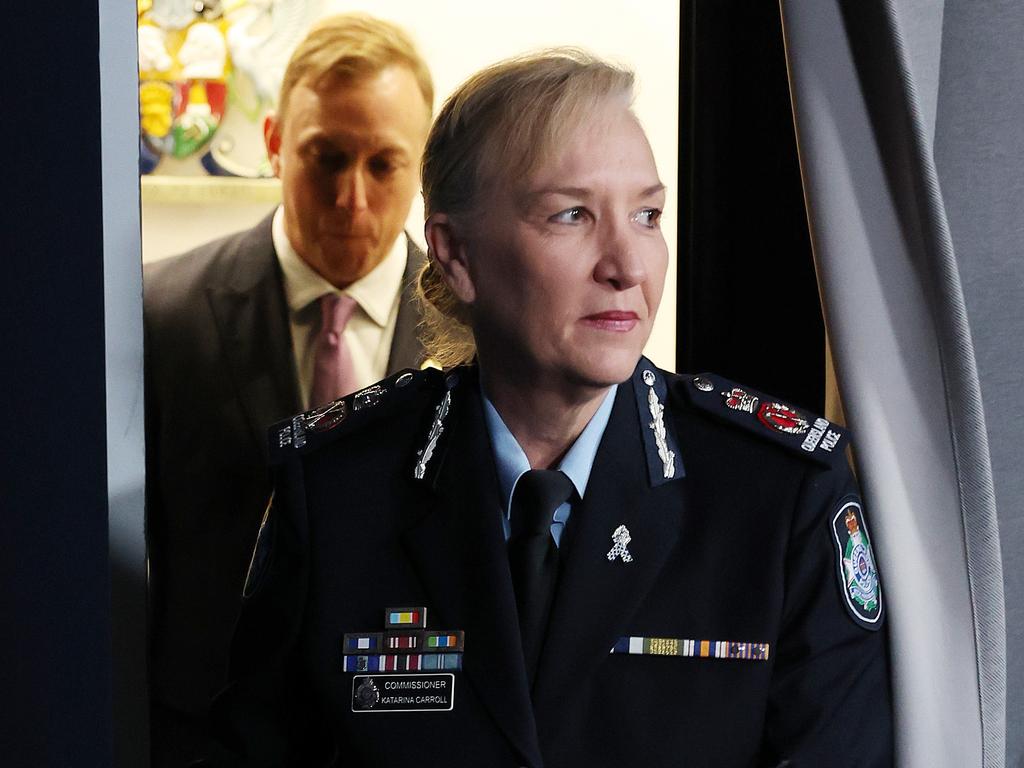


Was she pushed or did she jump? Katarina Carroll’s resignation as Queensland Police Commissioner this week brought to a head the poisonous politics surrounding youth crime in the Sunshine State, a rolling crisis that contributed to the downfall of one premier last December and threatens to doom another in Steven Miles.